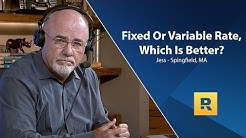Contents
When buying a home, you need to decide if you want an adjustable-rate mortgage or a fixed-rate mortgage. There are advantages and disadvantages to both.
· Adjustable Rate Mortgages. Typically, an ARM has a fixed interest rate for a specified period of time at the beginning of the loan, usually 5 or 7 years. After that initial period has passed, the fixed interest rate transitions to a variable interest rate, meaning the interest rate will vary depending on what’s happening in the market at that time.
 An adjustable-rate mortgage (ARM) is a loan with an interest rate that changes. ARMs may start with lower monthly payments than fixed-rate mortgages, but.
An adjustable-rate mortgage (ARM) is a loan with an interest rate that changes. ARMs may start with lower monthly payments than fixed-rate mortgages, but.
Answer: Adjustable-rate mortgages (ARMs) typically include several kinds of caps that control how your interest rate can adjust. Lifetime adjustment cap. This cap says how much the interest rate can increase in total, over the life of the loan. This cap is most commonly five percent, meaning that the rate can never be five percentage points higher than the initial rate. However, some lenders may have a higher cap.
Mortgage rates have already been declining since November and a Fed funds cut will likely have no impact." However, there may be some movement in variable-rate products like adjustable-rate.
Arm Mortage An ARM is a mortgage with an initial interest rate that lasts for a few years and then adjusts once a year after that. We’re not going to sugarcoat it for you – your interest rate (and monthly mortgage payment) will most likely go up after the ARM’s introductory period.
*Adjustable Rate Mortgage (ARM) interest rates and payments are subject to increase after the initial fixed-rate period (5 years for a 5/1 ARM, 7 years for a 7/1 ARM) and assume a 30-year repayment term.
Amortization Refers To Changes In The Monthly Payment For A Variable Rate Mortgage. Real Estate Prep Guide – Real Estate Practice Exams – real estate exam prep Guide Guarantee Your Success! Get instant access to one of the best Real estate exam prep guides on the net. Our challenging and easy to use sample tests will help you prepare for your Salesperson or Broker exam.
An adjustable rate mortgage (ARM), sometimes known as a variable-rate mortgage, is a home loan with an interest rate that adjusts over time to reflect market conditions. Once the initial fixed-period is completed, a lender will apply a new rate based on the index – the new benchmark interest rate – plus a set margin amount, to calculate the new rate.
On the variable-mortgage side, the average rate on 5/1 adjustable-rate mortgages ticked up. Rates for mortgages are in a.
Option Arm Mortgage Credit Suisse Unit Must face mortgage interest Suit – Rovai initiated the lawsuit in July 2014 accusing SPS of having incorrectly reported mortgage interest paid by homeowners with negative amortization loans. negative amortization loans, known as Option.Mortgage Rates Arm Discounts available for all adjustable-rate mortgage (arm) loan sizes, and selected Jumbo Fixed-Rate loans. Discount for ARMs applies to initial fixed-rate period only with the exception of the 1-month ARM where the discount is applied to the margin.
An adjustable rate mortgage (arm) offers lower initial rates and may be an excellent choice during times of high interest rates, rising income expectations or short-term homeownership. Example: 30-year fixed rate loan of $150,000 with a 10% down payment, an annual interest rate of 3.875%, and an APR of 3.984%, would result in a 360 monthly principal and interest payment of $705.36. Payment does not.
An adjustable-rate mortgage (ARM) is a type of mortgage in which the interest rate applied on the outstanding balance varies throughout the.